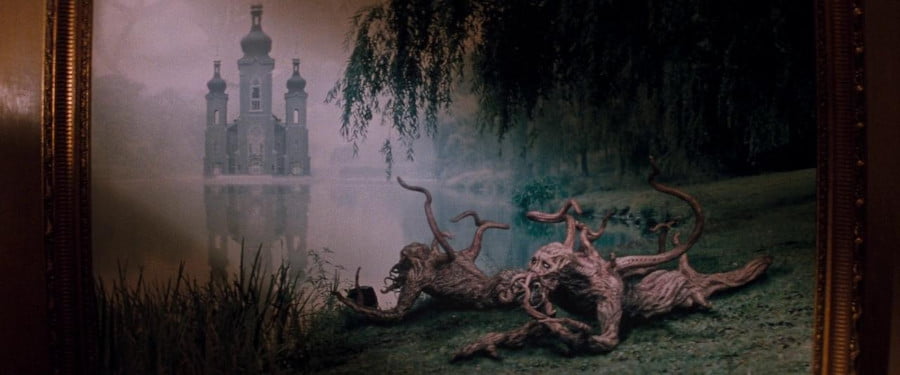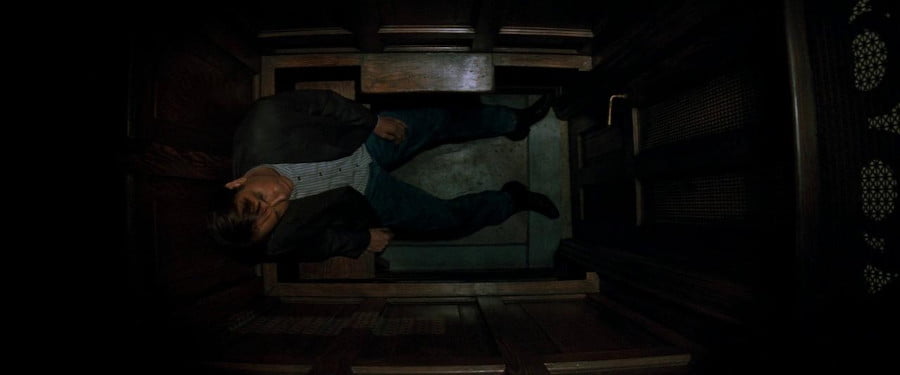Have you read the work of Sutter Caine?

this is real.
This is a real thing that happens.
Content Warning: Lovecraftian horror, Kingian horror, medical imprisonment, a dog is injured in this movie, suicide and axe murder, destruction of consensus reality, and body horror (both in movie and out).
I’ll also spoil the whole thing within two paragraphs. Like, I’m not going to mess around here.
In The Mouth Of Madness is a 1994 movie directed by John Carpenter, the will behind last year’s oh wow, this is surprisingly good’ movie The Thing. It’s a narrative that starts with a man being checked into an Insane Asylum, and all that implies, and the subsequent explication of his story to an interviewer. He tells the tale of how he started investigating what could only be described as a haunted reputation, a memetic horror that seemed to be expressed by people knowing or not knowing things about a horror author, who exists in a town that doesn’t exist, until it does, and then it always has existed.
The story culminates with the end of the world, and our protagonist and storyteller wandering out of a destroyed asylum, to stand before a movie theatre that starts to show the movie you’re watching, credits and all, as it cuts back to the storyteller feasting on popcorn and laughing.
The movie is great, though not the same kind of great as The Thing. While The Thing was paranoia and occluded information and complexity and implication with a premise that could do nothing but slowly bleed at you, this one is a different kind of venom to it. In this one, it’s more like uncovering layers of an infection, of discovering things are wrong, then wronger than that, then wronger than that until the final moment, at the end of the narrative, where the movie that you’ve been watching is itself part of the horror, and now maybe that wrongness is in you —

There’s a comparison often made with Kingian horror and Lovecraftian horror in this movie. Personally, I don’t see it, except in the most superficial ways. The horror of Lovecraft is often wedded to a discovery about the reality that already exists; it’s less about a coming apocalypse and more about the utter unnecessariness of same. The great wheels of the outer world, the things from beyond aren’t going to destroy our world by breaking things and infesting minds and becoming parts of movies, they don’t need to. They’re going to wipe us out one day by rolling over in their sleep. In King’s horror, there’s often a lot more of the direct, the personal, the individual, of things you can’t tell people about, because what good would it do, who would believe you?
Of course, I don’t fancy myself particularly informed on King. I could be very wrong there.
And there is some of that horror narrative at its root, the notion that there’s some sort of abiding dread, from the perspective of the written characters in a story. Characters who may yet abide some other life, some other way of being, but who come to terms with being what they are because the author makes them, as a sort of sadism, and that imagined horror of what it might be like to be a creature in a story. Imagine these people’s morbid dreads as they realise that that’s exactly what they are.
Good, chilling stuff, and it does a lot along the way. Particularly, in this unrealistic horror, of tentacles and spires and things that exist when you close your eyes, there’s a much more realistic horror that transpires around the whole thing: the breakdown of consensus reality.

At the time I write this, of the morning, I have heard a news story. It is about people who are taking a horse medication in order to address their concerns about a potential deadly global pandemic. By the time you read this, this may be settled business, it may have been dealt with, it may well be done with. But at this moment, my eyes half-closed and the words spilling through my fingertips into this strange form of page, I remember reading the accounts of people asserting the value of ivermectin as they dose themselves, because they find tubelike worms in their stools, in their leavings. They imagine, as they point into the toilet, that those strands of something that shouldn’t be there is a sign of the medication they take destroying their intestines, which spiral out into their leavings as… thin, tubelike worms.
The world we live in is one full of stories. There are stories we tell ourselves, and one another. Stories that make sense, stories about how things should go, so we can guide ourselves to how things will go. Stories that are shared and full of things that only work as long as we believe in them.
Institutions.
Money.
Nations.
There is a contingent of people that always believe stories that are destructive. Many times, they are only destructive to themselves, to one another in their small communities. Many of these stories shape the world in terrifying ways. Palestine is being bombed and children are being killed, because of a story about where the world might end, if we move the right bricks into the right pile in the right place. That doesn’t even need a lot of people to believe in it, just the right people in the right place, with the right will to do terrible things.
Much of how the world works, much of how it is is a consensus.
And we are living in a time when it is more and more obvious that there’s a terrible tale being told.
1 Trackback